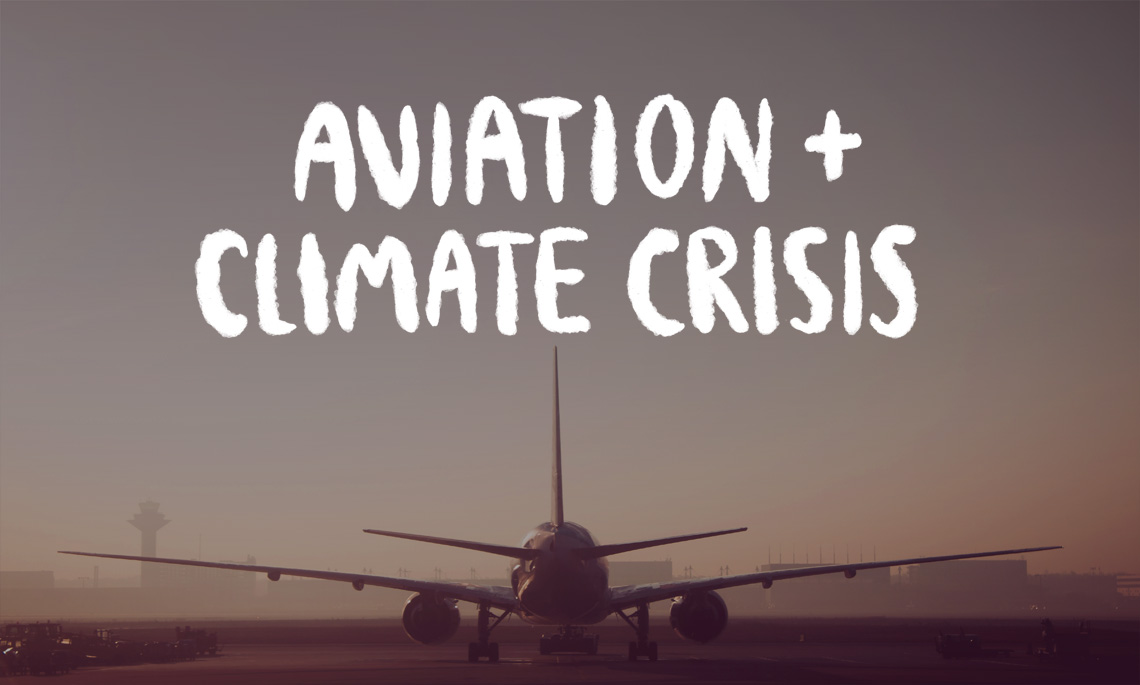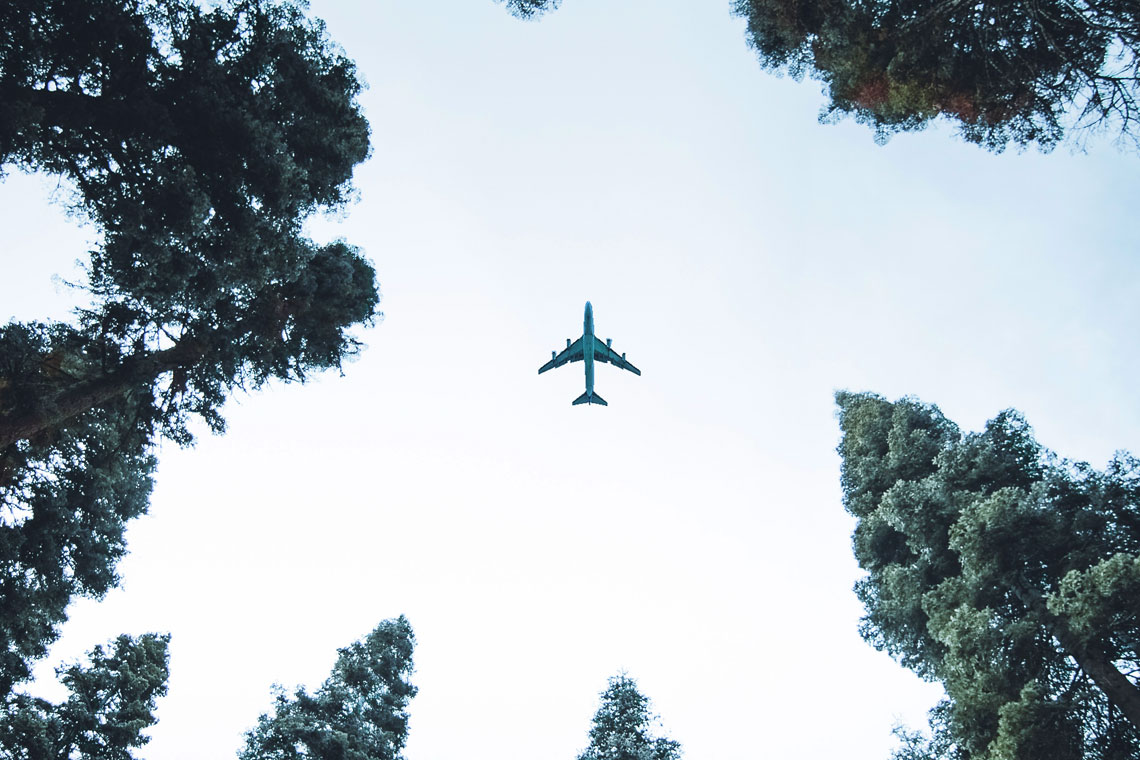Manifesto - Aviation

A Manifesto for the Future of Tourism
Aviation and the Climate Crisis

A new global plan
Climate crisis and our vacations
We are a travel company; we are not anti travel or anti all flying. However, we believe we must urgently find ways to travel more responsibly and to protect our environment.
The world is flying more than ever before. The aviation sector is one of the fastest growing contributors to greenhouse gas emissions, with air travel growing by 5 percent per year.
 If it was a country, aviation would be the 7th largest emitter of CO2 in the world, just behind Germany. In Europe, Ryanair has become one of the top 10 most carbon polluting businesses.
If it was a country, aviation would be the 7th largest emitter of CO2 in the world, just behind Germany. In Europe, Ryanair has become one of the top 10 most carbon polluting businesses.
Furthermore, aircraft emit more than just CO2, meaning aviation's total historical impact on the climate could be between two and four times greater than from CO2 alone. Left unchecked, aviation could contribute over a quarter of the world's carbon budget by 2050.
The effects of the climate crisis caused by emissions, threaten the landscapes and communities which we - as responsible travelers - so keenly wish to visit and contribute to.
No free pass for aviation
 Unlike petrol for cars, international aviation fuel is exempt from tax and VAT.
Unlike petrol for cars, international aviation fuel is exempt from tax and VAT.
A 2018 report by the Intergovernmental Panel on Climate Change (IPCC) recommended that to limit global temperature rises to no more than 1.5°C, global greenhouse gas emissions by 2030 must be 55 percent below 2017 levels. With the predicted rise in global air passengers even the International Civil Aviation Organization (ICAO) predicts that aviation emissions are expected to grow by up to 300% by 2050.
If we are to achieve the necessary global cuts in emissions, the aviation industry cannot rely on other sectors to take on the burden of reductions. Aviation needs to play its part and tackle its own emissions.
With the rise of low cost airlines, travelers can now fly from London to Barcelona for the price of a pizza and a beer or two. Why is air travel so cheap? Firstly, there is an oversupply driven by 'open skies' deals. In addition, unlike petrol for cars, international aviation fuel is exempt from tax and VAT. This constitutes a tax break of around £10bn annually in the UK. Economists from the IMF and World Bank believe it is time to address this issue.
Most countries do not tax aviation fuel and have mutual agreements with others not to do so. These have been in place since the 1944 Chicago Convention – signed decades before concerns over the climate crisis. The UK charges Air Passenger Duty (APD), which is similar to a tax but is nowhere near at the levels that the car industry faces, for example. Furthermore it is not ring-fenced for environmental use. To give some context, in 2017 APD raised £3.4bn, therefore representing a £6.6bn saving for airlines - the equivalent of every UK household subsidising aviation by over £240. Whether we choose to fly or not, we are making up the shortfall by paying a tax which lies unfairly unpaid by the industry.
In short, we are all heavily subsidising this polluting industry. Aviation is getting a free ride because the polluter pays principle has not been applied.

Current plans for reducing aviation emissions won't work
 Remarkably, international shipping and aviation are the only sectors not included in states' action plans under the Kyoto Protocol or the Paris Climate Agreement.
Remarkably, international shipping and aviation are the only sectors not included in states' action plans under the Kyoto Protocol or the Paris Climate Agreement.
Instead ICAO was charged with managing aviation's impacts on the environment. Unsurprisingly for an organisation which has been accused of secrecy and of being heavily influenced by the airline industry, it took almost 20 years for ICAO to develop CORSIA (Carbon Offsetting and Reduction Scheme for International Aviation).
The EU has tried to address aviation emissions too, through its Emissions Trading System (EU ETS) but again, its impact is limited as it only covers flights between countries in the European Economic Area.
With the aim of offsetting emissions growth after 2020, CORSIA's ambition falls massively short of what is needed if aviation is going to play its part in tackling the climate crisis. It does not cover domestic flights (around 40 percent of CO2 emissions) and as its first phase is voluntary, many high polluting nations have not yet signed up. Unless CORSIA is extended beyond 2035, only 6 percent of projected CO2 emissions from international aviation will be covered until 2050. Ultimately, CORSIA is an offset scheme, and these have been widely discredited.
 A 2017 study of offsets, commissioned by the European Commission, found that 85 percent of offset projects under the Kyoto Protocol's Clean Development Mechanism (CDM) - some of the most highly regarded offset schemes in the world - failed to reduce emissions.
A 2017 study of offsets, commissioned by the European Commission, found that 85 percent of offset projects under the Kyoto Protocol's Clean Development Mechanism (CDM) - some of the most highly regarded offset schemes in the world - failed to reduce emissions.
From 2021 the EU will stop allowing offsets to be counted towards emissions reductions targets. Aviation will however, continue to use offsets under CORSIA. Offsets delay action on the climate crisis. This is precious time we do not have.

The hope for the future
Our reliance on aviation fuel is the crux of the problem around efforts to decarbonise air travel. There are projects in full swing investigating the development of zero and low emission planes, including electric. These could offer carbon free solutions, if charged using renewable energy. Exciting progress is being made. The Norwegian government has set a goal of making all short haul flights electric by 2040, and EasyJet hopes to fly electric planes on some routes by 2027.
 There are projects in full swing investigating the development of zero and low emission planes, including electric.
There are projects in full swing investigating the development of zero and low emission planes, including electric.
However, as it stands, with existing levels of focus and funding, it could be two or three decades before these become commercially viable even for short routes. Whilst exciting, this is not soon enough to offer the significant, global reduction in emissions needed to meet the 1.5°C target.
While there is a real future for low carbon flying, we lack universal investment and commitment to it.
 There needs to be massive, unified financial investment and support at a national and international level, to give these technologies the very best chance of becoming a reality, as quickly as possible.
There needs to be massive, unified financial investment and support at a national and international level, to give these technologies the very best chance of becoming a reality, as quickly as possible.
In the meantime there is no alternative to a reduction in demand for aviation until we can decarbonise air travel. For most people this will change vacation patterns. We might take fewer vacations with flights. It might mean more vacations closer to home, or just fewer but longer vacations involving a flight. For some, it might rule out a flying vacation altogether.

Our plan
The green flying duty
 We are proposing a new global tax on aviation (based on a reformed version of the UK's APD) that will be ring-fenced for Research and Development (R&D) in electric aviation and to improve railway connectivity.
We are proposing a new global tax on aviation (based on a reformed version of the UK's APD) that will be ring-fenced for Research and Development (R&D) in electric aviation and to improve railway connectivity.
We want to:
- Increase APD in the UK. Tax payers should not be subsidising aviation by £240 per household. The exact level of APD to affect demand needs careful research, but studies have shown that raising fares by 10 percent would result in a 5 to 15 percent reduction in demand.
- Ring-fence APD revenues for R&D in electric planes and to improve railway connectivity. By renaming APD as The Green Flying Duty we make it very clear that this an environmental tax.
- Ensure the increase in APD is sufficient to reduce the demand for aviation until we can deliver electric planes.
- Encourage national governments to roll out The Green Flying Duty globally. Some already have similar schemes, for example the Norwegian Air Passenger Tax and the German Aviation Tax.
- Make APD fairer:
- First class, business class, premium economy seats are more polluting per passenger km (due to the extra space they take up). APD rises must be higher here (and for private jets).
- There will be a small rise for economy seats (APD hasn't increased since 2012).
- A new dedicated band for domestic flights (to discourage domestic flying).
 By reforming the existing APD system we ensure no additional costs are needed for changes to collection mechanisms.
By reforming the existing APD system we ensure no additional costs are needed for changes to collection mechanisms.
Read our FAQs on aviation and the climate crisis.
I'm a traveler, what can I do?
There are additional steps that you can take, including flying less, taking fewer but longer vacations, always choosing economy class (first class can have up to four times the carbon footprint) and flying direct where possible. You can also look into which airlines have the lowest emissions per passenger mile. And when you do fly, make it count by choosing a vacation that benefits local communities and wildlife. We don't claim to have all the answers to the problem of aviation and the climate crisis but we welcome your feedback. This is a crucial fork in the road for the travel industry and is only the beginning.
We don't claim to have all the answers to the problem of aviation and the climate crisis but we welcome your feedback. This is a crucial fork in the road for the travel industry and is only the beginning. 
- Justin Francis, CEO of Responsible Travel
Resources
- Aviation emissions and reductions
- Paris & Kyoto Climate Agreements
- CORSIA - the UN's plan for handling aviation emissions
- EU ETS/cap and trade
- Carbon offsets
- Low emissions planes & electrofuels
- Heathrow expansion - the wrong plan for aviation emissions
- Frequently Asked Questions
- MP Letter - UK Green Flying Duty




